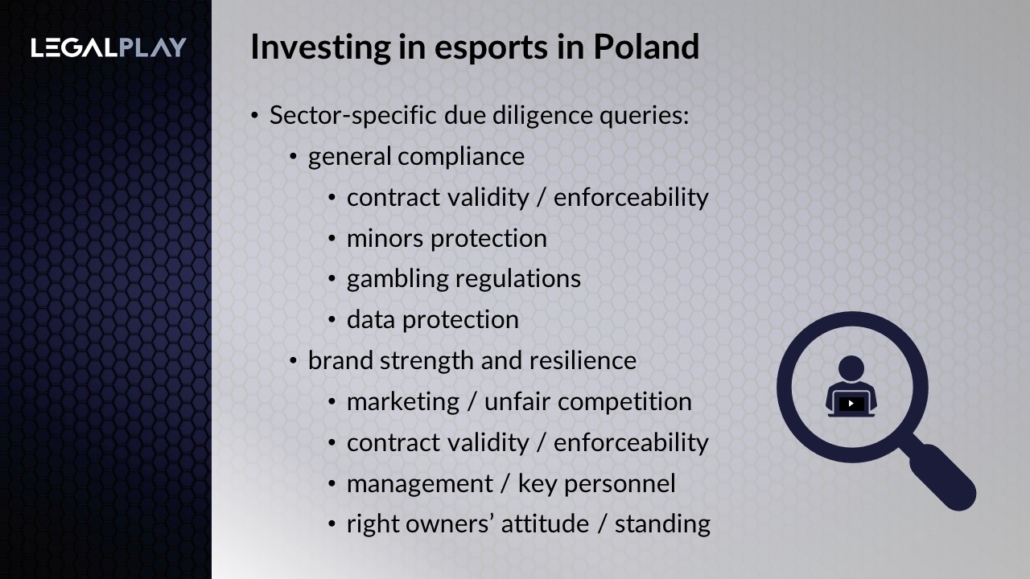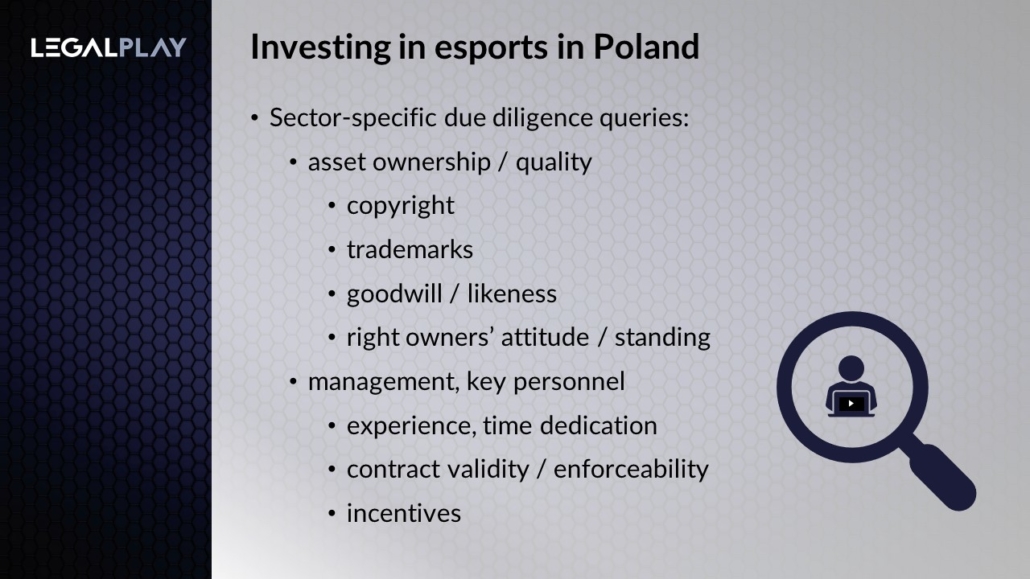
Coming back from this year’s edition of the Esport & Gaming Forum, the biggest annual conference in Poland concentrating on business aspects of professional gaming, I was amazed by how many new companies become actively engaged in the esports community each year. It obviously has to do with the growth rate of this market, seeing wider social acceptance and growing numbers of spectators at gaming tournaments. Following the people, there are more and more brands willing to get a foothold in the biggest new trend.
Given that Poland, and especially the Silesian city of Katowice, has proved to be a bright spot on the esports map of Europe over the course of the last couple of years (I am talking of course about hosting the Intel Extreme Masters World Finals since 2013), and that there are currently several professional teams operating in Poland with notable success, I thought I should discuss the actual status of esports in Polish law.
The traditional approach of dismissing video games as juvenile entertainment is shifting. Many countries around the world have already decided to classify competitive gaming as a sport under their national laws. No surprise that the first country to do so was China (2003), which recently (2019) went as far as to recognise esports players, via its Occupation Skill Testing Authority recommendations, as an official profession. Some other countries have done the same, including Turkey (2014) and the Philippines (2017).
When it comes to Poland, we are still a few steps behind those countries. However, it is not like our parliament decided to completely ignore the esports phenomenon. In 2017, a change was introduced to the Polish Act on Sport of 2010. Ever since then, any form of “competition based on intellectual activity, which aims to achieve a sports result” should be treated as a sport under Polish law.
Justifying the need for that change in law, the Polish government (which initiated the legislative procedure) argued that not only physical activity facilitates strengthening social ties or building one’s self-worth. In the statement of reasons for the bill, we read that engaging mental activity by playing sports bridge, checkers or chess, as well as electronic sports creates the opportunity for intellectual development, strengthens social relations, promotes socialisation of participants, adds confidence. The effects of intellectual activity in a social aspect are therefore similar to practising physical activity. It should also be borne in mind that a professional approach to chess, checkers, sports bridge, as well as electronic sports requires participants to engage in physical activity. In addition, chess, checkers, sports bridge and electronic sports develop reaction speed and develop strategic thinking.
The consequences of the legal recognition of “intellectual sports”, including esports, as sports, are mostly of prestigious nature. The change created, however, additional opportunities for esports professionals, in particular to seek financing of their esports-related activities, receive best player scholarships, better sponsorship and marketing deals, as well as tax exemptions for championship prizes.
Another major change in law for esports is currently waiting for the Polish President’s signature to enter into force. The new amendment to the Polish Act on Sport potentially opens a door for competitive gaming to gain legal status similar to that of traditional sports by enabling esports organisations to create an official Polish sports association. The consequences of that ability are quite significant because such an association is legally entitled to:
- organise and stage sporting competitions for the title of Polish Champion and for the Polish Cup in a given sport
- establish and implement sporting, organisational and disciplinary rules in sporting competitions organised by the association, with the exception of disciplinary rules regarding doping in sport
- appoint the national team and prepare them for the Olympic Games, Paralympics, deaf games, world championships or European championships
- represent this sport in international sporting organisations.
So far, the ability to create a Polish sports association was reserved for organisations being members of an international sports federation operating in an Olympic or Paralympic sport or other federation recognised by the International Olympic Committee. That, at least for the time being (but maybe not for long anymore?), excluded any esports organisations.
The new law gives additional competences to the Polish Minister competent for physical culture, who will be able to specify, by regulation, a list of international sports federations not recognised by the International Olympic Committee, whose members will be able to obtain consent for the creation of a Polish sports association. This will be possible based on high popularity and level of development of a given sport, as well as the range of the international sports federations of organisations involved in that sport and their participation in the system of combating doping in sport.
Once the new law enters into force, the blooming Polish esports organisations will be able to institutionalise. The question is whether they will be interested in seizing that opportunity. After all, esports and traditional sports, although similar on many levels, also differ in many areas. It is not crystal clear whether having official organisations representing particular esports in Poland will be an interesting option. And, besides all that, whether the right holders of particular games will be willing to co-operate with an official Polish sports association, trying to regulate what was once their exclusive domain.




